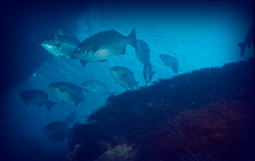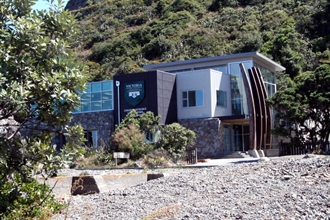
The Shima LabSTUDYING LIFE HISTORIES AND POPULATION DYNAMICS IN THE SEA |
Information for Prospective Students |
|
New Zealand is a fantastic place to complete an MSc or PhD degree, and the people, facilities, and infrastructure at the Coastal Ecology Lab are second to none. Notably, Victoria University of Wellington is also ranked number one in New Zealand for overall research quality, and for our discipline (Ecology, Evolution and Behaviour). Jeff welcomes inquiries from highly motivated, hard-working students, with research interests that match his own. This GoPro video gives a good indication of what field work can look like for members of our lab group (on a good weather day). |
|
Te Toki a Rata - Home of the School of Biological Sciences on our main university campus |
Te Toka tu Moana - Home of the Coastal Ecology Lab on Wellington's south coast |
Interested in joining our group. Tips from Jeff:What you should do if you're interested in working with me... Please note that I receive a large number of expressions of interest, and applications for graduate programmes. If you send me an email that clearly indicates you know nothing about me or my research interests, do not expect a reply. If you are serious about working with me, please read the research section of my web page, and also please read some of my publications to get a sense of the types of questions I ask, and the approaches that I take. All of my former students' theses are available for download from this website (see Lab Alumni), and these give a very good indication of the range of projects that I might be willing to supervise, and the expected quality and scope of a PhD or MSc thesis in New Zealand. If you are still interested, then please think about the types of research questions that drive you, and then contact me by e-mail to pitch your ideas. In this first correspondence, you should also include your Cv, your GPA (and standardised test scores if applicable), contact details for two people who can provide you with strong letters of reference (if asked), and some description of your previous research experiences (if any).
Expected funding arrangements for MSc students and PhD students are somewhat different. MSc students must be able to cover their own tuition and fees (currently~ NZ$8000; there are relatively few fully funded opportunities for MSc students in NZ, but see the Victoria University website for scholarship opportunities). MSc students from most other countries (except those that have bilateral agreements with NZ) are charged tuition/fees at an international student rate (see Victoria International for more information), and this is prohibitive for most students. Under current NZ laws, PhD students from any country pay domestic tuition and fees. This (along with the good research infrastructure and exciting, relatively unexplored ecological systems) makes New Zealand an outstanding venue for PhD studies (and our programme is filled with top PhD candidates from around the world).
My PhilosophyI encourage my students to develop their own, independent research programmes--but the nature of most marine field work means that my students often need to collaborate and assist one another (e.g., as dive buddies, boat tenders, etc). I encourage a team-based approach, whereby graduate students work together and often supervise and mentor their own undergraduate research assistants. My lab group is diverse (and we value this and always aim to increase it), social, and fully engaged in science and the academic environment within the University. My students value critical interaction, and seek out a diversity of scientific input. They are quantitative, they present their results in discussion groups and at scientific meetings, and they publish their work in international journals. I expect to supervise students who are self-motivated and driven by research questions rather than by a particular study system or species, and I challenge my students to combine field, lab, observational, and experimental approaches.
Funding OpportunitiesProspective students should consult the Victoria Scholarships Pages for a list of potential funding opportunities. In addition, all prospective students from overseas should contact the Victoria International Office. Many countries have their own funding schemes that will cover the costs of MSc/PhD studies in New Zealand (e.g., UK Commonwealth Scholarships, CONICYT Scholarships, Fulbright)--and I have supervised PhD students funded under all of these schemes. Residents of the United States who already have a PhD can apply for International Post-Doctoral Fellowships (US National Science Foundation, International Programs) to study in New Zealand. |
|
|
|





